My project is about the Thai people and their feelings toward waste and what has already been built. This is shown primarily in the Muslim fisherman villages along the coast. These fisherman are slowly adopting modern technology and practices. However, those in regard to trash, maintenance, and recycling are less widespread. Many of the villages are resourceful and use much some “trash” with great utility. Unfortunately, the villages often have no means to dispose of trash and many do not even collect trash from the beaches. The issue of waste and conservation is a global issue and governmental. Everyone needs to play their part, even if few do. The rising Thai awareness is outpaced by growing Thai trash and refuse. These villages are concerned with global market prices for the goods they buy and sell, but there is no set price for a clean beach and a clean home. Thailand will have to eventually balance that against the more things and money which will eventually themselves become trash.
-

What Could be Beautiful
Severely neglected beaches are often encountered in non-tourist areas of Thailand. Often public education in rural areas about the value of a clean community is nonexistent. Hepatitis is endemic to some communities.
-

No Route for Disposal
This house collapsed and amazingly was just left. The occupants either no longer needed the house or felt it easier to produce new lodgings than to fix the old. Things such as disused structures are often not tallied, asking the question about how we even define waste. A lack of preventative measures and maintenance was a common theme throughout Thailand.
-
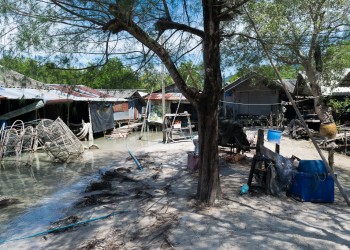
Repurposing
This Gypsy village is in stark contrast to the previous community. No waste is visible except trash that is craftily used as containers or for some purpose. In rural Thailand very little is recycled. This method of reuse is even better for the environment and more fiscally responsible. The gypsies have been known for their nomadic tendencies, but show more concern for their final stop then most in Thailand. Trash and waste are inherently matters of perspective.
-
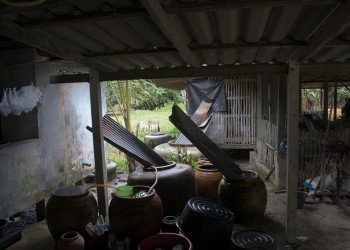
Rainwater Recovery
Many of the rural Thai are forced to reduce their consumption, recycle their waste, and recycle whatever they can. Here is an example water being retrieved at no cost. Unfortunately, many of these older solutions have issues such as sanitation and cleanliness. This is put into perspective since only 5% of Thailand’s water is for domestic use.
-

Recycling Collection
The bright colors of plastic and advertisements make the ensuing trash just as whimsical. Advertising and logo design dollars go further when only 20% of Thailand’s trash is recycled.
-

Road Removal by Hand
Not all waste is plastic on the ground. This worker is trying to remove this concrete slab with a shortened sledgehammer. The use of a machine, or even a longer handle, would cut the work time considerably. As would the help of the four gentlemen behind the photographer. In a growing economy good job numbers do not always show efficiency waste.
-
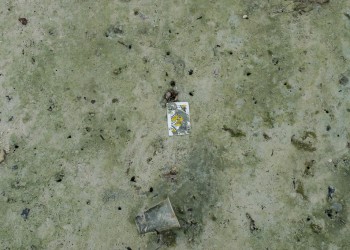
Playing Card
Every piece of trash tells a story and gives a lesson. This card came from somewhere and from someone. Thailand produced 27 million tons of waste in 2015 and 15 tons in 2009. I have yet to see another card anywhere in Thailand. This card was found on a beach in Koh Samui.
-

Trash as an Inheritance
Multiple generations enjoy time on the beach. This trash has seen three generations and will not disappear until dozens more have seen it. Every person of every generation will add dozens of tons of trash to the pile.
-

Trash as a Landscape
The refuse here is so thick it has had an impact on the flow of water into making an unintentional Grand Canyon. This was on a beach in Koh Samui.
-
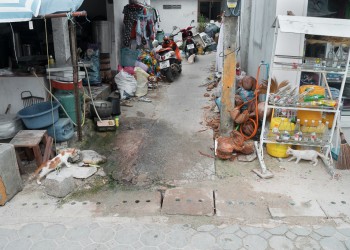
Cats
The animals of Thailand are less concerned about the trash. The animals see them as new opportunities. Many animals, monkeys in particular, will even be aggressive about collecting what we see as waste.
-
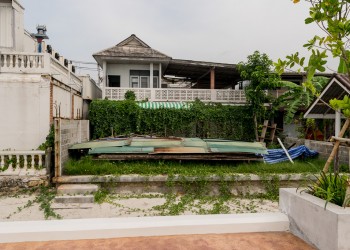
Left in Place
The remains of what could be a collapsed house or a strange boat sit front and center on a seafront lot. This will not be tallied as waste for Thailand, but it can still leach toxins into the earth.
-

Blood Flower
Not all waste needs to be products. A botched slaughter leads to erratic designs on a crossroads in the middle of town.
www.seas.columbia.edu/earth/wtert/sofos/Thailand_MSW_Chak_essay.pdf
infofile.pcd.go.th/mgt/Overview_waste.pdf
web.nso.go.th/eng/en/indicators/environ/environ00.htm











